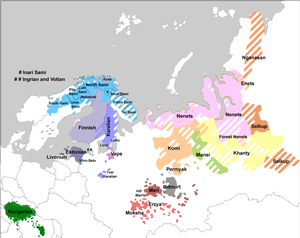| Bjarmian languages | |
|---|---|
| (geographic) | |
| Geographic distribution | Bjarmia |
| Extinct | early 2nd millenium |
| Linguistic classification | Uralic
|
| Language codes | |
 Map of Bjarmia, where the Bjarmian languages were spoken | |
The Bjarmian languages are a group of extinct Finnic languages once spoken in Bjarmia, or the northern part of the Dvina basin.[1] Vocabulary of the languages in Bjarmia can be reconstructed from toponyms in the Arkhangelsk region, and a few words are documented by Norse travelers. Some Saamic toponyms can also be found in the Dvina basin,[2][3] and Permic peoples also inhabited Bjarmaland.
Affinities
[edit]There were likely many Finnic languages spoken in Bjarmia. The first one was an archaic Finnic language with the diphthong *ai instead of Finnic ei, lack of consonant gradation and the vowel /ɤ/. However, toponymic and historical data also suggest that later Karelian speakers also later migrated to the Dvina basin in the 15th and 16th centuries, just before the Slavic tribes had arrived.[2]
Some toponyms in Bjarmia also have the sound /ʃ/ instead of /s/.
Janne Saarikivi suggests that some Sámi languages were spoken in Bjarmia alongside Finnic languages.[2]
Reconstructions
[edit]Many toponyms in the Arkhangelsk oblast are of Finno–Ugric origin, together with the Vologda oblast. According to Aleksandr Matveyev, there are up to 100,000 such toponyms.[2]
| Bjarmian | English |
|---|---|
| *kaski | burnt-over clearing |
| *hattara | bush |
| *lauta | board |
| *palttV | slope |
| *lima | slime |
| *kelta | yellow |
| *petra | wild reindeer |
| *pime | dark |
| *haina | hay |
| *leettek | fine sand |
| *varkas | thief |
| *kicca | narrow |
| *ruske | red |
| *kylmä | cold |
Legacy
[edit]Some Finnic substrate words can be found in Northern Russian dialects, for example the words: лахта (lahta) 'marsh, moist place, meadow', луда (luda) 'rocky islet', каска (kaska) 'young woods' and щелья (schelja) 'hill or steep bank by a river'. Such words can be found in the Russian dialects around Pinega.[2]
Gandvík is a name associated with Bjarmia that appears in Norse poems. The word could have been a Norse translation of a Finnic word, which is "Kantalahti" in Finnish. The word Vína appears in many Norse sagas that refer to Bjarmia; it is likely related to the Finnish word "Vienanmeri" (White Sea). Norse sagas also documented a Bjarmian word "Jómali", which is likely related to Finnish "Jumala" 'God'.[3]
See also
[edit]References
[edit]- ^ Hauge, Arne (22 November 2018). "Kadonnut, Mystinen Bjarmia". Ruijan Kaiku (in Finnish). Retrieved 1 October 2021.
- ^ a b c d e Saarikivi, Janne. Substrata Uralica: Studies on Finno-Ugrian Substrate in Northern Russian Dialects (PhD). Helsinki, Finland: University of Helsinki. ISBN 978-952-10-4519-6.
- ^ a b Koskela Vasaru, Mervi (2016). Bjarmaland (PhD). Acta Universitatis Ouluensis B Humaniora 145. Oulu, Finland: University of Oulu. ISBN 978-952-62-1396-5.
Further reading
[edit]- Helimski, Eugene, "The "Northwestern" Group of Finno-Ugric Languages and its Heritage in the Place Names and Substratum Vocabulary of the Russian North", in Juhani Nuorluoto (ed.), Slavica Helsingiensia 27: The Slavicization of the Russian North. Mechanisms and Chronology. Helsinki. 2006.
- Jackson, Tatjana N., "Bjarmaland Revisited", in Acta Borealia 00-2002. 2002. A survey of Western and Russian Literature on Bjarmaland.
- Ross, Alan S. C., Terfinnas and Beormas. London: Viking Society for Northern Research. 1981. Reprint of 1940 Edition.
- Saarikivi, Janne, "The Divergence of Proto-Uralic and its Offspring: A Descendent Reconstruction", in (eds.) Bakro-Nagy et al., The Oxford Guide to the Uralic Languages. OUP. 2022.
